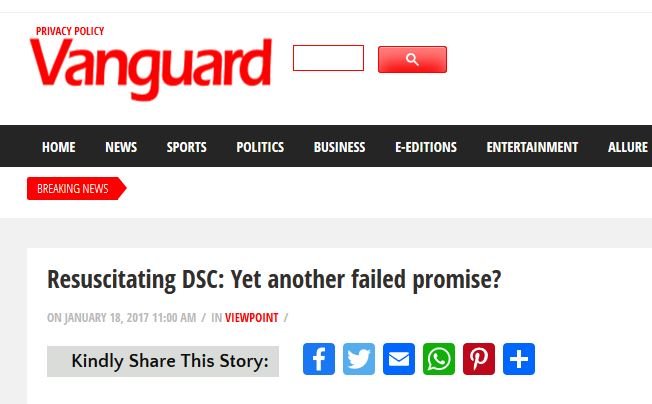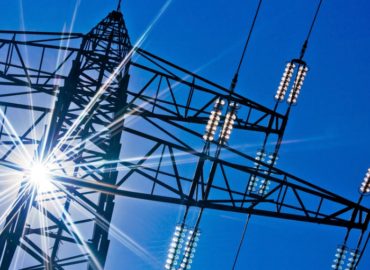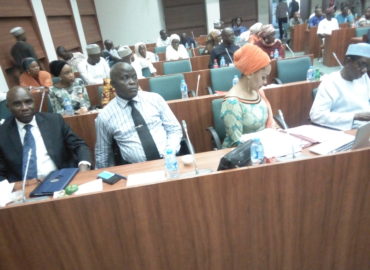THE story of Delta Steel Company Owvian-Aladja is undoubtedly one that leaves a sour taste in the mouth of everybody especially the stakeholders. Delta Steel plant, commissioned in 1982 was to usher Nigeria into the league of steel producing countries, an inevitable stepping stone to industrialisation, national development, self-reliance and self-determination as steel has become one of man’s most important technological materials after the First and Second World Wars.
With its application cutting across industries and every conceivable aspect of human endeavour such as bridges, high rise buildings and theatres, automobiles, railways, ocean liners, and aircrafts, electrical and electronic equipment, farm tools and tractors, home appliances, food containers and a vast number of products that are used in offices, schools, homes, hospitals and for recreation, steel imports into Nigeria annually will be on the rise from the average USD 3.3 billion. Even the upstream and downstream sectors of the revered petroleum and petrochemical industry are sustained by steel products directly or indirectly in rigs, drills, pipelines, casings, valves and fittings, reactors, columns, extruders, boilers etc The above informed the euphoria and high expectation at the inception of the company which was eternally captured in the editorial of the MECON JOURNAL published in December,1976 thus “…… Nigeria today stands on the threshold of economic development…. By establishing these plants, the people and Govt. of Nigeria will not only make a claim for a place in the World Steel Fraternity, but all neighbouring countries”.
MECON is an acronym for Metallurgical & Engineering Consultants (India) Limited and was responsible for project monitoring and supervision of the construction of the steel plant. As a Government of India Enterprise, MECON actively participated in the success story of steel development in India. This dream unfortunately remained unfulfilled till 1997 when production was stopped in all the plant units. Attempts to reactivate the plant in 2003-2004 was stifled because of the impending privatisation of the company by Bureau of Public Enterprises, BPE, which was concluded in February 2005. 80 percent of the company shareholding was sold at the cost of USD30 million (then about N3.75billion) while the Federal Government retained the remaining 20%. The privatisation of the company unfortunately did not turn around the fortunes of the company but rather worsened it. By September 2011, the company was again brought to her knees as production which had averaged about 11% during this privatisation period was finally stopped. Not only that, the plant was left in a worse state than when it was sold and had accumulated over N40 billion debt compared to the paltry N3.75 billion it was sold for.
There was no single value addition from this investor. This development led to the taking over of the company into receivership by Asset Management Company of Nigeria, AMCON, in May 2012. AMCON resold DSC to Premium Steel and Mines Limited, PSML, and handed over the company on 26th March, 2015. Going by the dastardly past of the company and the inexplicable contempt the company has been held by the various agencies of government, it was heartwarming when the Executive Governor of Delta State Dr. Ifeanyi Okowa was reported to have assured the nation in The Guardian Newspaper publication of 5th November, 2015 “that moribund DSC would start operation in 14 months”.
This time was already a clear 7-month lead period from the date the plant was handed over to the new owner (PSPL). The newspaper reported that he (Governor Okowa) was optimistic about the future of the establishment (DSC) going by the fruitful discussions he had with the new owners as regards the revamping during the recent Indian/African Business Summit he attended with President Muhammadu Buhari in India. The newspaper quoted Governor Okowa as saying “In our visit to India, I met with one of the companies that recently took over the Delta Steel Company Aladja and I thank God because they are serious minded and committed to reviving the company and I believe that in another twelve to fourteen months, DSC will come alive again with many other companies in the state.”
This pronouncement which was given extensive coverage in the print and electronic media could not have come at a better time considering the dilapidated state of the plant, the unpaid emoluments of the workers, the nation’s average annual foreign exchange expenditure of over USD3.3b for steel imports, the economic downturn of the immediate community and the state arising from the closure of the company. But alas, the 14 months have come and gone from the date of this historic pronouncement, nothing is on ground to suggest that the plant can become operational in another 14 months. In these last 14 months, nothing tangible has been done except replacing the DSC signposts with that of Premium Steel and Mines Limited. In other words, almost two years have gone from the date of handover without any visible progress towards resuscitating the plant. Going by the failed commitments and numerous lackluster performances of many of these core investors, many had wondered what insight did the governor have before coming to this conclusion which was an emphatic and far reaching pronouncement to the state and the nation on DSC. Did the governor have the privilege of reviewing the post acquisition plan, PAP , of the new owner if there was any for the plant? Was due diligence carried out on the PAP? Why did the governor fail to conduct even a peripheral due diligence rather than mortgaging his hard earned reputation on such an important issue? Or did the Governor just rely on the usual sweet tongue of some of these core investors? Did the Governor and even AMCON who presided over the sale put any arrangement on ground to at least monitor the activities of the new investor’s PAP and its targets? Did everybody as usual go to sleep after the sale and this announcement? Or should we not have taken seriously or trusted the pronouncements from our able Governor?
We need to remind ourselves that government privatised many of its companies primarily to make them operate efficiently, provide jobs and impact on the economy and not for monetary gains hence they were sold fairly on liberal terms. Regrettably, the way and manner these companies were abandoned by the relevant government agencies without any post privatisation monitoring seems to support the arguments that they were privatised primarily to relieve government of any responsibility by just transferring ownership hence government could not be bothered with what happens to these enterprises after privatisation.
The DSC story has been pathetic, the staff were prodded on to accept 5-year severance package which ordinarily is meant for dead pensionable staff which has remained unpaid 11 years after privatisation. This was in clear contravention of the constitutional guaranteed rights of pension for life for these hapless unsuspecting Nigerians. The fallout of this neglect is the over 700 deaths recorded among the pensioners since 2005. Thanks to this present administration’s zero tolerance for impunity, a ray of hope may be coming the way of these long neglected workers as their requests for integration into the monthly pension scheme in line with section 173 of the Constitution of the Federal Republic of Nigeria is already before the Federal Government. I appeal to our governor not to relent this time around in agitating for DSC to be revitalised in line with his pronouncement 14 months ago. A bi-partisan approach should be adopted to realise this dream. When leaders fail, the people suffer.
Mr. Anthony Madagua ,a commentator on national issues, wrote from Abuja.
Read more at: https://www.vanguardngr.com/2017/01/resuscitating-dsc-yet-another-failed-promise/




